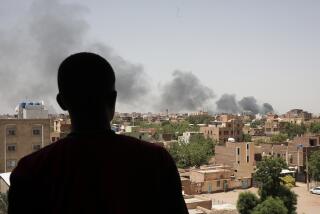Aspin Ties GIs’ Somalia Stay to Goal of Security
- Share via
WASHINGTON — Defense Secretary Les Aspin said Friday the United States plans to bring its forces home from Somalia as soon as they have re-established adequate security in the country, but he provided no firm timetable for achieving that elusive goal.
In a speech before a foreign policy group, Aspin said the roughly 4,600 American military personnel now in Somalia--including 1,600 combat soldiers and 3,000 logistics troops--would stay “long enough to complete their mission and no longer.”
“The completion of the mission chiefly concerns security in Somalia,” he said.
Aspin cited three specific conditions that must be met before U.S. combat troops can be brought back: Security must be restored in south Mogadishu, Somalia’s warlords must be disarmed and the Somalis must establish a police force to replace U.S. troops.
But he warned that the 3,000 U.S. logistics troops that are supporting other U.N. forces probably would not return home until later, after the security situation in Mogadishu has improved enough to enable civilian contractors to take over their duties.
Aspin’s remarks, drafted in consultation with other top national security advisers, were designed to allay growing uneasiness in Congress about the timetable for withdrawal of U.S. forces from Somalia. Some lawmakers have said they fear the commitment will become open-ended.
U.S. troops recently have become the object of guerrilla attacks in south Mogadishu. The Administration has sent 400 U.S. Army Rangers--along with a handful of specially trained Delta Force soldiers--to bolster existing units and help quell the violence.
But Aspin gave no estimate of how long it might take for the security problem to be solved, and other U.S. policy-makers said there had been no change in the Administration’s expectation that American forces would remain in Somalia at least through 1994.
Despite some hints that he might do so, Aspin failed to spell out any new rationale for why U.S. troops should remain in Somalia, saying only that “unless we return security to south Mogadishu, political chaos will follow the U.N. withdrawal.”
The secretary’s remarks came as the last of the 400 Ranger troops ordered to Somalia last weekend arrived in Mogadishu to bolster security there and hunt for fugitive warlord Mohammed Farah Aidid, whose militiamen have been responsible for most of the attacks.
Although reporters were barred from witnessing parts of the Rangers’ arrival, military sources said the troops brought sophisticated high-technology equipment capable of detecting possible ambush attempts and of locating Aidid and his lieutenants.
U.S. officials have become convinced that Aidid must be captured before security can be restored in south Mogadishu, but they have been reluctant to say so publicly for fear that his continued ability to elude U.S. forces will become a major embarrassment.
Aspin mentioned Aidid only in passing Friday, warning that unless he is captured, “other warlords will follow (his) example.” Eventually, he said, fighting among the warlords will resume and “the situation will return to what existed before” the United States sent in troops last December.
At the same time, Aspin complained that the current focus on security issues is “much too narrow,” asserting that any solution to Somalia’s problems “must be much more than . . . military.”
He said the famine that gripped Somalia before U.S. forces arrived has disappeared, agricultural production has been revived and U.N. officials feel confident enough to end their emergency food delivery program at the end of this month.
Aspin also set several medium-term objectives for rebuilding the country’s economy and political structure. He said the United Nations should beef up its troop strength in Somalia, speed up its efforts to set up a police force and develop a long-range strategy for reconstruction.
He also suggested that the United Nations form a core group of nations to support its political reconstruction efforts--much as it has done in the case of Cambodia--with the bulk of them drawn from African and other Third World governments.
And he urged the Organization of African Unity to help bring the warring factions “back together on the peace track,” using previous U.N. conferences on Somali national reconciliation as a model.
Aspin spoke before the Center for Strategic and International Studies, a Washington research group that is devoted to defense and foreign policy issues. Officials said he specifically sought the opening as a way to get the Administration’s message across.
Meanwhile, in Mogadishu, wire services reported that hundreds of Somalis, mainly women and children, took to the streets again Friday in another round of anti-American protests, apparently organized by Aidid’s militiamen.
Witnesses said the demonstrators blocked the October 21 Road--which has been a staging area for Aidid supporters--for more than 4 1/2 hours before finally dispersing, while U.S. helicopters flew over the city once again in a conspicuous show of force.
More to Read
Sign up for Essential California
The most important California stories and recommendations in your inbox every morning.
You may occasionally receive promotional content from the Los Angeles Times.












